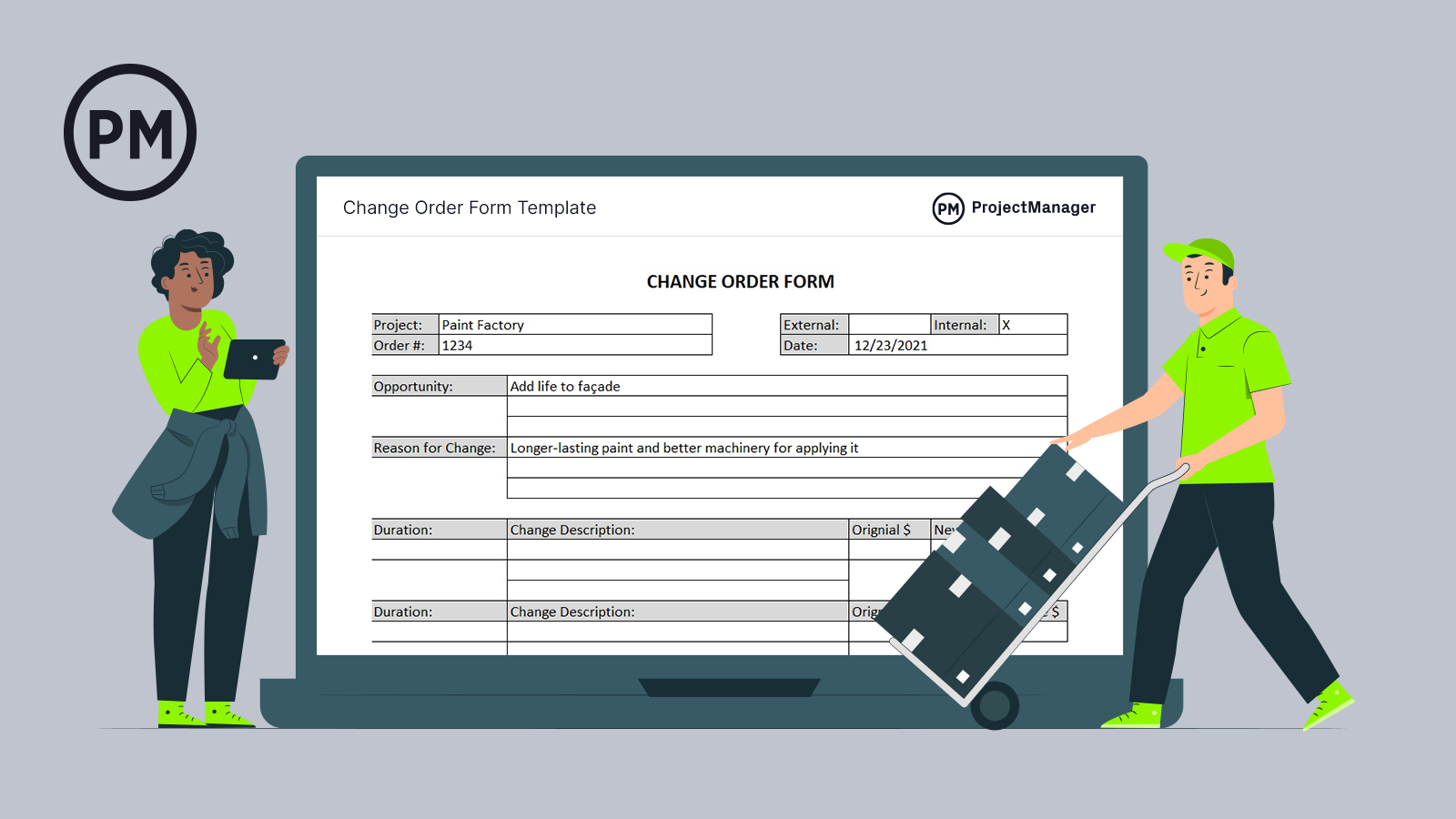
Use this free Change Order Template for Excel to manage your projects better.
Download Excel File

Construction projects are prone to change. There might be inclement weather that causes delays, stakeholders with changing expectations or supply chain issues that strain your schedule and budget. Change is almost certainly going to occur, so how do you manage it and keep your project from going off the rails?
The answer is by using a change request form. Capturing the change, defining it and then having it authorized or rejected keeps the scope of the project in check. Make sure your project stays on track by using our free construction change order form template for Excel.
A construction change order captures any modifications to the scope of work in a project. It details what work is being proposed, how much that change will cost and if it will cause delays to the established construction schedule.
The change order revises not only the schedule but the budget, too. The change will affect when contractors are paid for their work, and a construction change order form is a mechanism used to save time when implementing those changes and payments.
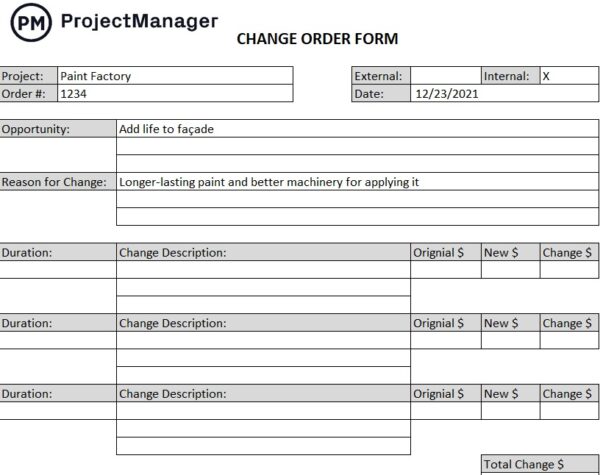
In short, a change order form is an amendment to the construction plan or contract. It changes the scope of work and therefore needs approval before initiation because it will likely result in an increase in the budget. Therefore, the construction change order form must be approved by both the owner and contractor.
Change order forms give owners and contractors the flexibility to respond to changes as they occur over the life cycle of the project. Using a change order form template is helpful because it helps you standardize your change management process and minimize any costs or delays that come about because of the change.
After the change is approved or rejected, the construction change order form template creates a paper trail that details why the change was approved or not. This is critical for change control as it helps to lessen the likelihood of either party blaming the other for the change in scope (or worse, entering into litigation) as the details have all been laid out using a standard change order template both parties can use.
Of course, papers can get lost or misfiled. Project management software keeps change order forms easy to access and track, and ProjectManager takes change management even further by doing it all in real time. Attach change order forms to cards on your kanban board and get transparency as they’re implemented. Set the priority so your team knows what to work on first. Customized tags simplify searches. See the percentage complete and even share a view-only kanban board to keep everyone on the same page.
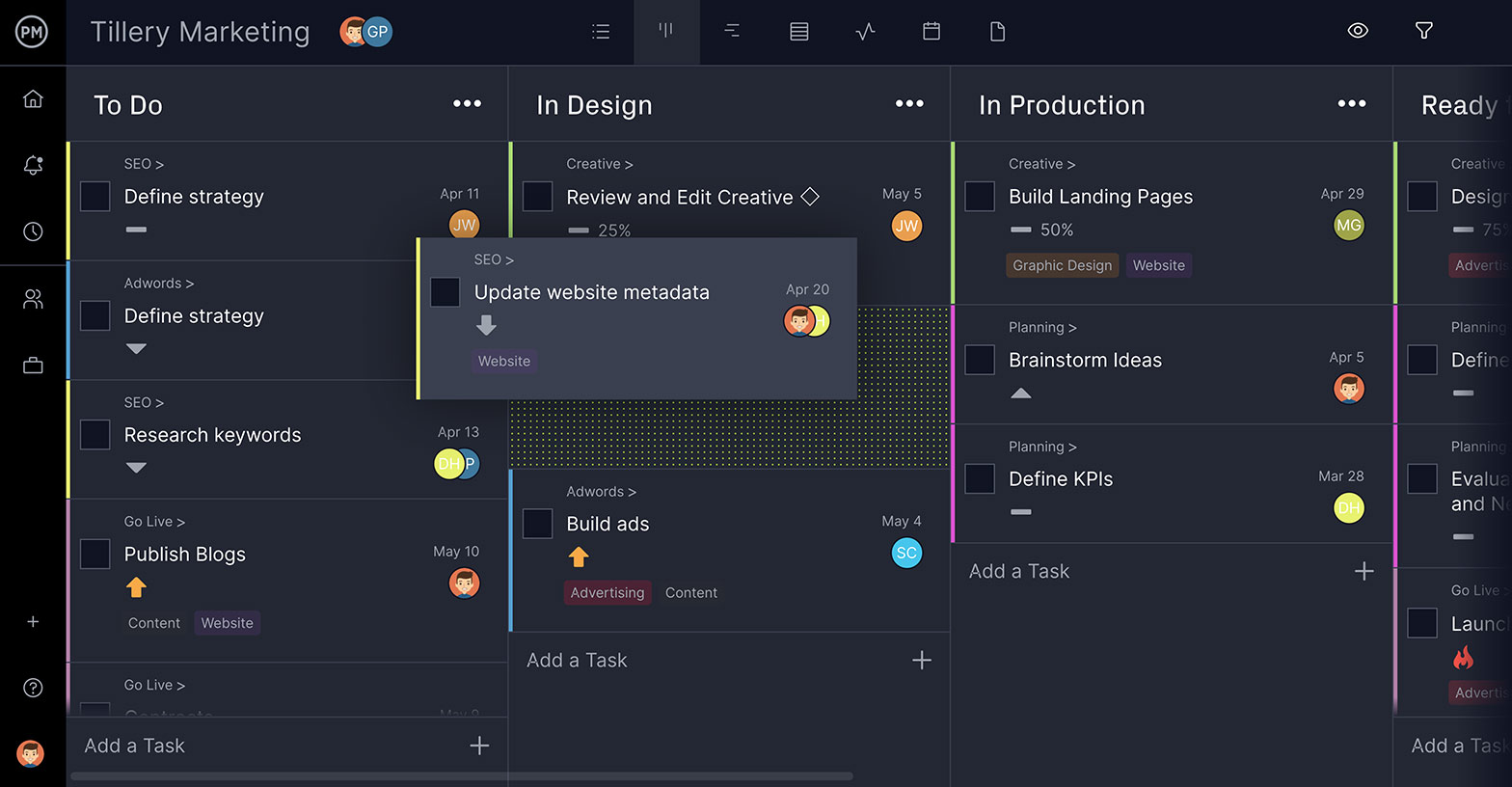
We’ve established the importance of using a construction change order template in general terms, now let’s zoom into some key benefits from using one.
Scope creep occurs when the scope of work of a project is altered by adding, removing or modifying the tasks from the construction plan after the project has started which causes the project scope to grow without the supervision of the project management team.
Because these changes to the project scope aren’t controlled by the project manager, they’ll affect the project schedule and budget, as these additional tasks require resources and time that were not accounted for in the original project plan.
Luckily a construction change order template can help you keep track of any changes made to your scope of work, which helps you avoid scope creep.
This construction change order template can help you establish a change management process for your team or organization. By using one standard form, you can better understand change orders across your projects.
One of the main benefits of using this construction change order form template is that it is a very versatile format that can be used by construction project owners, construction firms, general contractors and subcontractors.
Both the owner of the project and the contractor may use this change order form template. That includes general contractors, subcontractors and sub-subcontractors. All need to be involved in the approval process if they’re participating in the change.
Once the construction change order form has been approved, it is included in the body of the original contract for the work being done. This is a legal issue in that if payment is delayed, the contractor has a right to file a mechanic’s lien.
This change order form template can be used whenever there is a request to change the contract between the owner of the project and one of the contractors hired to fulfill that contract.
When there is a change requested, a change order template is used to manage that change and keep the project on schedule and within budget. A change order form is likely only used during the execution, control and monitor phases of a project. It is during the fulfillment of your deliverables that these changes are likely to come up.
ProjectManager’s free change order template is key to managing change in your project, keeping your schedule and staying within budget. It has been designed to be used for any industry, including the construction industry where change order forms are frequently used to amend the project contract.
The template starts with interoffice information, such as the name of the project, the order number, as well as if the change is external or internal and the date of the change order form’s request.
The next section defines the change, as well as the reason for the change. The opportunity is outlined, which explains why the change is necessary or how it can improve the overall final deliverable of the project.
Here is where the change is described. That change is detailed to make it clear what work needs to be done. This can include the materials and labor involved. The duration is estimated, giving a clear idea of how long the whole job will take. Pricing is also estimated.
Finally, the construction change order form concludes with who requested the change, their company and contact info. Underneath that is a signature line for approval and date to indicate when the change order was approved.
ProjectManager is award-winning software that organizes work and keeps your project running efficiently. Features help plan, monitor and report progress to boost productivity when managing a project. These same tools can streamline your change order process.
Instead of using a static template, you can create change order forms in our software. Use the kanban board, which is a visual tool to track workflow. Your changes can be represented as cards stacked beneath columns that show the production cycle from to do, doing to done.
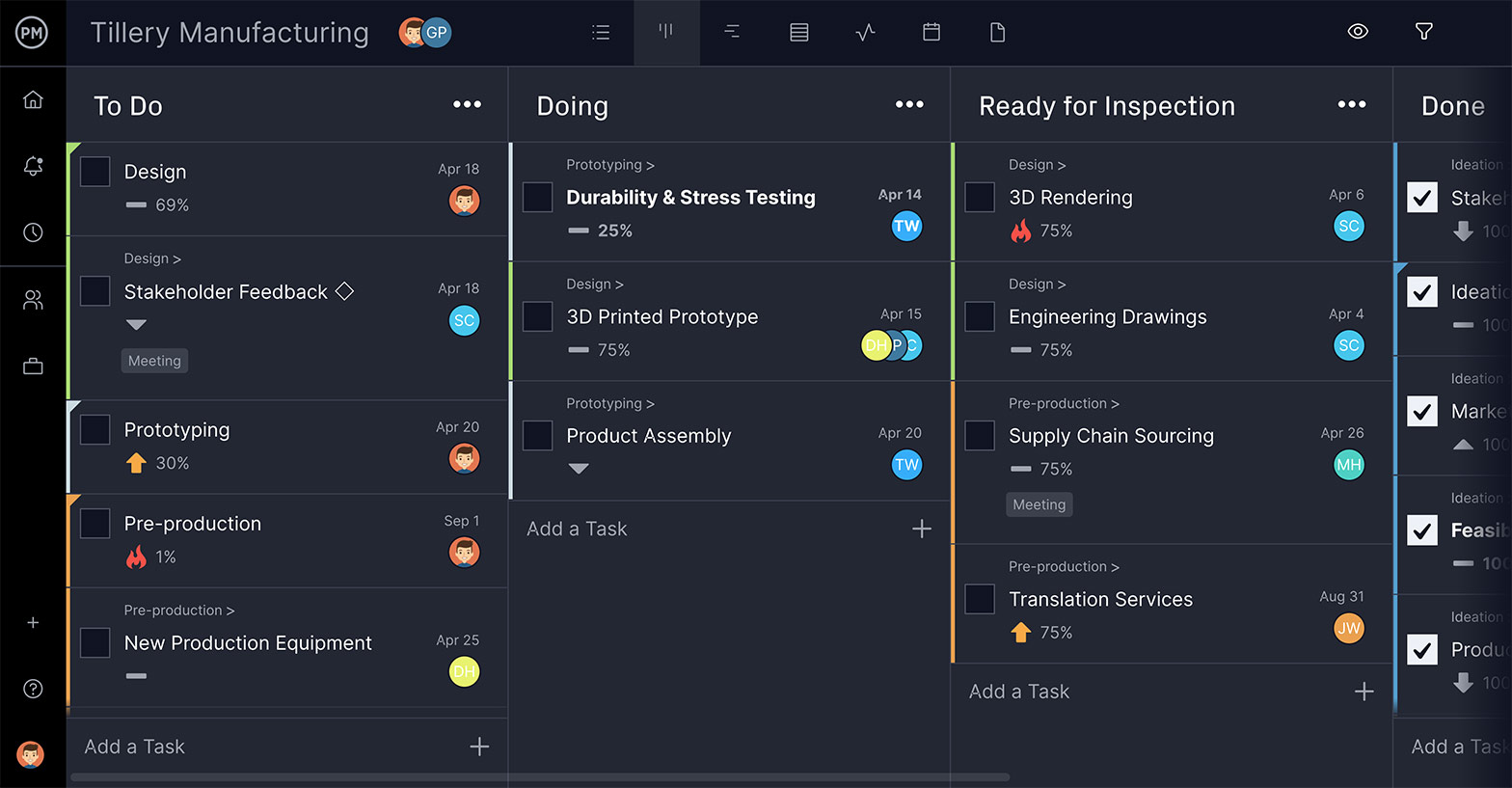
The cards can hold descriptions and you can attach any files that might be related. Tags can be added to determine department, priority and more. The hours, cost and deadline can all be set. Then just assign it to the person responsible for executing the work.
Their progress is updated as they change the status of the order and that data is instantly reflected throughout the software, so you can make sure the work is going as expected. Add the task to a timesheet and you can monitor the hours logged on the work and streamline the payment process.
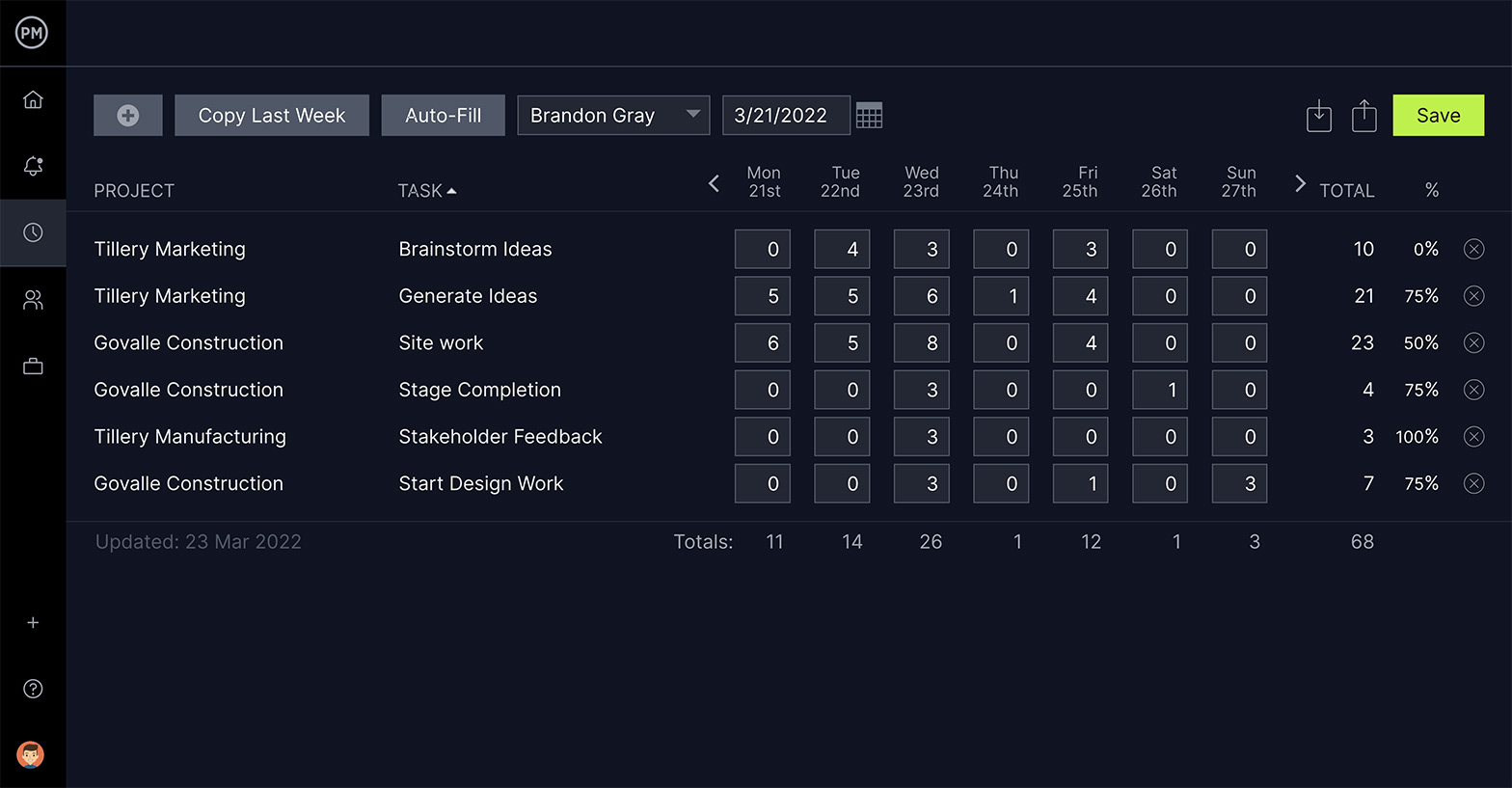
Because our software is cloud-based, all the information you receive is in real-time. There’s also unlimited file storage, so you can save all your change order forms in one centralized hub. Of course, this is only one aspect of the software, which can help you manage the project throughout all its phases, so you don’t have to be jumping from one application to the next.
Our site has great resources for those new to project management or seasoned journeymen. There are hundreds of informational blog posts and tutorial videos as well as dozens of helpful project management templates to get you started right.
Some projects and organizations use a change request template in addition to a change order form. A change request is a preliminary step before a change order is issued. Usually the party that wants to request a change to the scope of work will submit a change request form, which is then reviewed by the change steering committee which will decide whether the change request is approved and can be turned into a change order.
As you create change orders and adjust your construction project plan accordingly, you’re going to need a tool to keep track of the changes that are made. This change log template is a document that allows you to document all the change orders that are produced over the course of a construction project.
Often used with the change order form template is the RFI, which can be used as a means to get further information as you whittle down the contractors, vendors or suppliers to those who can meet your financial and time constraints.
It is also a channel to ask questions of the contractor, vendor or supplier who you chose after your change has been approved in order to make sure the work is done properly. This free request for information template allows you to minimize busy work and maximize the job at hand.
Another template is often part of the change order process. The RFQ is another way to make sure that whoever you’re contracting with meets the requirements of your project budget. It is often one of the three steps to securing a contract with a vendor or supplier. The other two are the request for proposal (RFP) and request for information (RFI).
While these are usually part of the beginning of the project as you build relationships with outside contractors, they can also help refine the change order process. Use our free request for quote template to keep your changes within the boundaries of an acceptable budget.
Using ProjectManager to manage your project and the changes that come up throughout its life cycle is one way to control your costs and keep on track. Assign, track and archive project changes while planning, monitoring and reporting on the project’s progress and performance. Get all the features you need to bring your projects in one time and within budget. Try ProjectManager free with this 30-day trial.
Deliver faster, collaborate better, innovate more effectively — without the high prices and months-long implementation and extensive training required by other products.